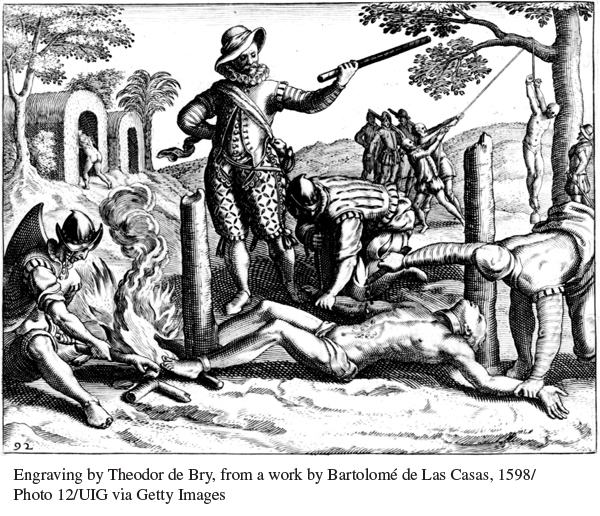A History of Western Society: Printed Page 457
A History of Western Society, Value Edition: Printed Page 440
A History of Western Society, Concise Edition: Printed Page 457
European Debates About Indigenous Peoples
Iberian exploitation of the native population of the Americas began from the moment of Columbus’s arrival in 1492. Denunciations of this abuse by Catholic missionaries, however, quickly followed, inspiring vociferous debates both in Europe and in the colonies about the nature of indigenous peoples and how they should be treated. Bartolomé de Las Casas (1474–1566), a Dominican friar and former encomienda holder, was one of the earliest and most outspoken critics of the brutal treatment inflicted on indigenous peoples. He wrote:

To these quiet Lambs . . . came the Spaniards like most c(r)uel Tygres, Wolves and Lions, enrag’d with a sharp and tedious hunger; for these forty years past, minding nothing else but the slaughter of these unfortunate wretches, whom with divers kinds of torments neither seen nor heard of before, they have so cruelly and inhumanely butchered, that of three millions of people which Hispaniola itself did contain, there are left remaining alive scarce three hundred persons.21
Mounting criticism in Spain led King Charles I to assemble a group of churchmen and lawyers to debate the issue in 1550 in the city of Valladolid. One side, led by Juan Ginés de Sepúlveda, argued that conquest and forcible conversion were both necessary and justified to save indigenous people from the horrors of human sacrifice, cannibalism, and idolatry. He described them as barbarians who belonged to a category of inferior beings identified by the ancient Greek philosopher Aristotle as naturally destined for slavery. Against these arguments, Las Casas and his supporters depicted indigenous people as rational and innocent children, who deserved protection and tutelage from more advanced civilizations. Both sides claimed victory in the debate, but it had little effect on the situation in the Americas.
Eagerly reading denunciations of Spanish abuses by critics like Las Casas, northern Europeans derived the “Black Legend” of Spanish colonialism, the notion that the Spanish were uniquely brutal and cruel in their conquest and settlement of the Americas. However, the legend also helped northern European powers, like France and England, overlook their own record of colonial violence and exploitation.